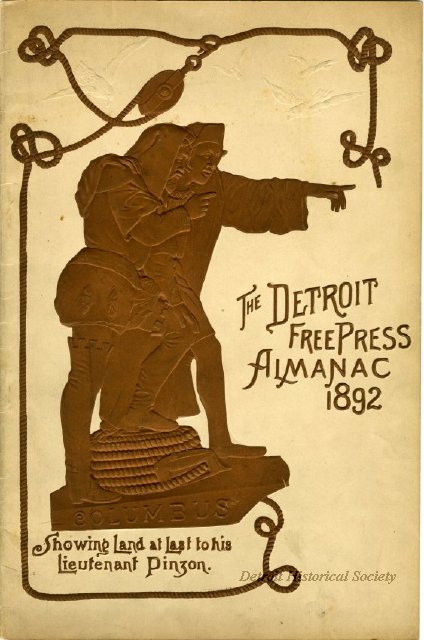The first issue of the Detroit Free Press was published on May 5, 1831 under the name The Democratic Free Press and Michigan Intelligencer. Citing a need to establish a newspaper sympathetic to Andrew Jackson’s Democratic Party, John R. Williams and his uncle Joseph Campau, under the auspices of their business, Joseph Campau & Company, bought out the Oakland Chronicle in Pontiac, and moved the equipment to an office at the corner of Bates and Woodbridge streets in Detroit. Sheldon McKnight, former publisher of the Detroit Gazette, was publisher.
The newspaper went through a series of name changes, first dropping “Michigan Intelligencer” from the masthead to become the Democratic Free Press in 1832. The name was changed to Detroit Daily Free Press in 1835 when it became the area’s first daily paper. After some waffling back and forth among other titles, Daily Free Press, Free Press and Democratic Free Press, a variety of owners, and a variety of weekly and daily editions, the Detroit Free Press became the permanent name in 1848.
Wilbur F. Storey bought the paper in 1853 and created a series of innovative firsts for the Free Press, such as the first regular Sunday edition in the nation. He emphasized not only the local news but expanded coverage of national news via the telegraph. During the Civil War, Storey’s correspondents sent reports from the battlefields, making the Free Press a nationally-known source for the latest news. However, Storey is also charged with publishing “many items in the guise of news stories designed to heap ridicule on blacks,” according to Frank Angelo’s history of the newspaper.
The Free Press, in its early history, despite outwardly noting it was not in favor of slavery and supported the Union cause during the Civil War, regularly printed content that was vehemently anti-abolitionist, and was littered with derogatory terms for African Americans as well as inflammatory racial pieces. Free Press founders Williams and Campau were slaveholders, and the paper was a mouthpiece for Jacksonian principles. This tone faded in time with political shifts and change in ownership.
In 1881, the Free Press became the first American newspaper to be published in Europe when William E. Quinby introduced a London edition. During his time as editor and owner, the Evening News (now Detroit News) started publication in 1873, beginning a circulation battle that exists today, and hand-set type was replaced by the linotype, revolutionizing the printing industry.
The Free Press won its first Pulitzer Prize in 1932, and has won 10, more than all other Michigan newspapers combined. During this time, and up until his death in 1959, Edgar A. Guest published his homey poems in the Free Press and was syndicated in 300 newspapers. John Knight bought the Free Press in 1940 bringing the paper under group ownership for the first time, creating some concerns over the independence of the paper. During 1960–1980, the competition for market dominance continued among a number of local papers, ultimately leaving two papers in the Detroit market, the Detroit Free Press with a late night and morning edition, and its main rival, The Detroit News, an afternoon newspaper.
1989 saw the adoption of a 100-year Joint Operating Agreement between the Knight-Ridder-owned Free Press and the Gannett-owned News, where the two papers would share business operations as the Detroit Newspaper Agency. The papers split profits but keep their editorial staffs separate. The two papers published a combined Saturday and Sunday paper until May 2006, when the Detroit Free Press resumed publishing its own Sunday edition. Due to the terms of the Joint Operating Agreement, the News is allowed to include its editorial page within the Sunday edition of the Free Press. Earlier, in 2005, Gannett purchased the Free Press while selling off the Detroit News. Gannett is also the publisher of USA Today.

